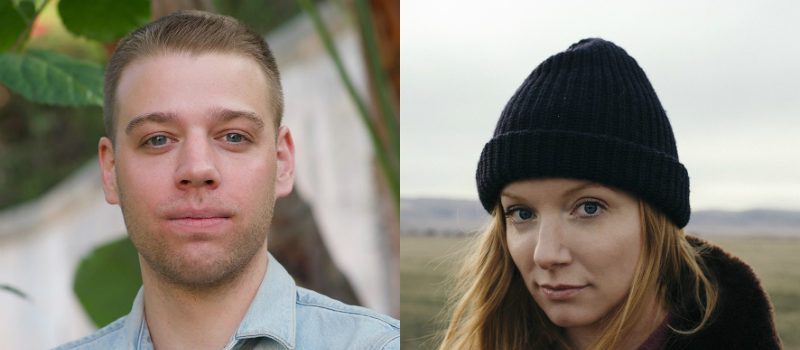Them That Follow centers around a preacher (Walton Goggins) and his flock of believers in rural Appalachia. Goggins’ Lemuel is a true-blue fire and brimstone religious leader who utilizes viciously venomous snakes with his congregation as part of the service. It is a means to cleanse oneself of sin in a way that takes a literal interpretation of the Bible to task in terms of serpents and them serving as an agent of God. The film does an uncanny job of capturing not only what it is like to be a part of such a religious group, but also paints the most three-dimensional of portraits of those who inhabit this landscape.
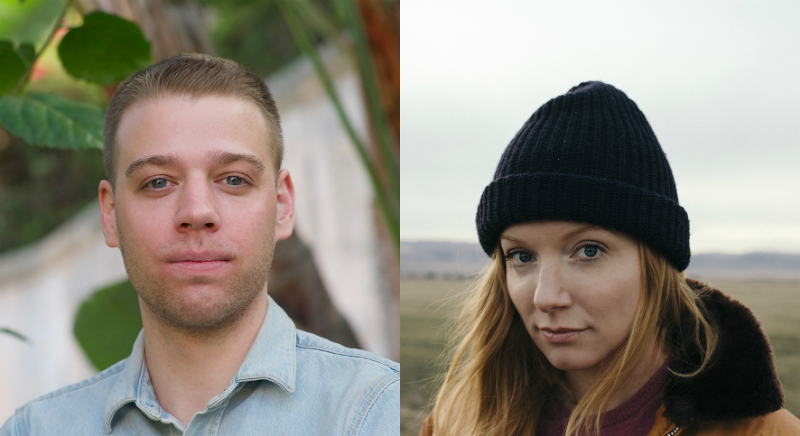
Writer-directors Britt Poulton and Dan Madison are first time auteurs and the script they produced must have been something because the ensemble they were able to assemble is extraordinary. From Goggins, recent Best Actress Oscar winner Olivia Coleman to comedian Jim Gaffigan and the break-out star from this year’s stunner Booksmart (Kaitlyn Dever), it is a cast rich with talent and they all rallied behind the creative duo making their big screen debut to tell this story because it is timely, important and above all else, rivetingly entertaining and enthralling.
The Movie Mensch caught up with Poulton and Madison for an exclusive chat where we learned the origins of this story … like seriously—how did this thing come to be?! The pair also address what it is about the other that has them so creatively connected at the hip. After all, writing is normally an incredibly solitary endeavor (he writes, sitting alone!). Much of the film is anchored by the actress who portrays Goggins’ preacher’s daughter. Alice Englert is Mara and if what she is going through cannot be believed by the audience, the entire effort of Them That Follow falls apart. For such a young actress, it is uncanny what she is able to achieve given that she is the lynch pin that essentially carries the entire picture.
Don’t miss our exclusive chat with Them That Follow star Walton Goggins!
Poulton and Madison were incredibly affable, informative and provided some priceless insight into one of the more intimate and powerful films to grace screens in 2019.
The Movie Mensch: Where on earth did this thrilling tale come from? What was the genesis of this story?
Britt Poulton: I grew up in a religious home and community, so I really wanted to explore a coming of age story that felt akin to my own. The things of my own adolescence, and what it’s like for a young person to come into themselves with such high stakes. Whenever you need, they try to satiate. Every question they ask, everything they do … they have to contend with not only the consequences for this life, but the next. And I think that’s an extraordinary amount of pressure to put on a young person and that was a pressure I was inspired to investigate in this community, and through Mara’s story. [Also], what it feels like to reconcile faith and doubt, and knowledge and instinct, in this life and the next. These really big questions all to come of age around. So that’s where I began and that was my first entry point into this story.
Dan Madison: Mine was a little different in a lot of ways. I see this film as a culmination of a lifelong fascination with snake handlers. I remember when I first learned about them, I was taken aback, truthfully even a little scared. I think its understandably frightening to see someone putting their life on the line, for something as tangible as their faith. I really wanted to get to know them. I felt this burning curiosity to understand what brings them to church on Sunday, why they take these risks and why they pick up these serpents? But more than that, really the project of the film was to show the fullness of their life, because no person is defined by one single thing. People of faith, however devout they may be, they may be solely defined by that. It’s also about family. It’s about fathers and daughters. It’s about best friends. It’s about a young woman and the man she loves, and the family that she’s trying to build with that person. That, I really think at the core, is what the film is about.
The Movie Mensch: Yeah, no question. And casting across the board for Them That Follow was just utterly brilliant. I must start with your Mara, Alice. What was it about Alice? Because she, in a lot of ways, carries this movie. What was it about her that you knew she could do what she did?
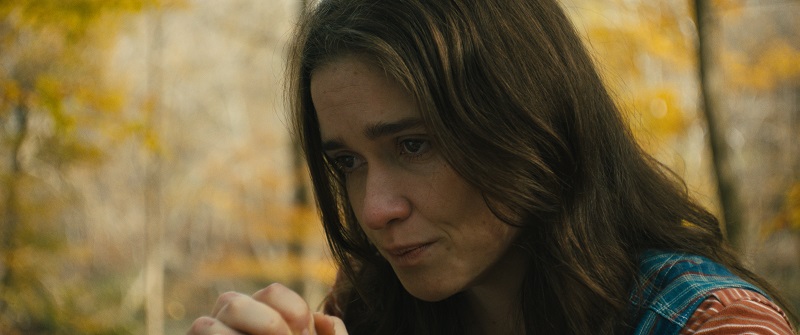
Britt Poulton: Alice was our very first piece of talent that we attached to the project. She’s actually been on this journey with us for five years, from the very first draft—which wasn’t even fully formed and far from it. We saw her in a film called Ginger & Rosa, a Sally Potter film and we were blown away by the pathos and power she brought to that role. Especially as such a young person, I couldn’t believe how she could embody all the mystery of the universe in each scene. We sent her the script and luckily, she responded to it. It was a match made in heaven. There is no other Mara … this story belongs to Alice and she was a partner to us in authoring it in so many ways. She is remarkable.
Dan Madison: It’s a film that’s about a young woman coming of age, wrestling with faith and doubt. That’s a very internal journey. It’s a very quiet journey. It informed us how we directed with a lot of close ups. We knew that we needed an actress that really embodies that intelligence and that quiet deliberation. We saw that in Ginger & Rosa, and we knew she could do it. We knew that’s what we needed for the film.
The Movie Mensch: Walton Goggins is always sensational. But I think he took it to another level with Them That Follow. What will you remember most about working with Walton?
Britt Poulton: His commitment, his unflagging commitment to this character, to his craft. He is the highest bar. Every day we just came to set just wanting to rise to that occasion. There is nobody more committed than Walton Goggins. He approaches every role with such sincerity, such veraciousness. That’s the quality of Lemuel that we wanted to explore—that intensity, that commitment, that sincerity. For us, there was no other Lemuel. Whoever we cast in that role, if we didn’t believe them, then we wouldn’t believe our world. We wouldn’t believe this film. They had to carry a pathos, a nuance, a poetry and not be some one-note dominating force. We needed to feel like he wasn’t just a pastor that could lead his parishioners, that he was a father who loved his daughter. For one actor to be able to embody those two identities, especially when they come into conflict, we had no other choice but Walton Goggins.
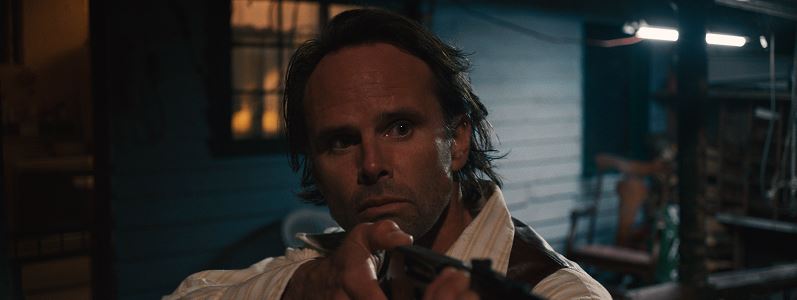
Dan Madison: Great answer!
The Movie Mensch: Yeah.
Dan Madison: I have nothing to add [laughs].
Britt Poulton: He’s amazing!
Dan Madison: He is amazing.
Britt Poulton: He was lovely and charming, as he is talented.
The Movie Mensch: You have a unique character there because you have a flock, so to speak, and he has to be their shepherd.
Britt Poulton: Yes!
The Movie Mensch: And only a certain actor could really pull that off and he certainly was it.
Dan Madison: Yeah, and I think the other thing is Lemuel is also a father. One of my favorite things in it is seeing him having to navigate that challenge when he is placed in the position of worrying about his daughter’s immortal soul and driven to the point where he’s willing to sacrifice her life in this world. You know, he plays all of these shades of such nuance, where you see him struggling to inhabit both of his key roles—at once, as her pastor, but then also as her father.
The Movie Mensch: The little things that he does as an actor. The little sleight of hand touches on the shoulder of another actor … those kinds of things you just can’t direct. It’s just something that he does. Gosh, it just blew me away. Now speaking of blowing me away, there’s Olivia Colman. Now you guys got a front row seat to our most recent Academy Award Winner For Best Actress …
Britt Poulton: Oh, you mean the queen?
The Movie Mensch: Why yes, the queen of all queens. What, in your estimation, makes her so special? I mean, she is just beloved. When they announced her name at the Oscars, everyone went nuts. They were so happy for her. You guys got to work with her. What makes her so special?
Dan Madison: Well, I think I, on a personal level, she’s an absolute joy and she’s hilarious. I’ll also say that as a performer and as an actor, she has this incredible immediacy. She is so present. Her emotions are so accessible to her that she moves through scenes and slips into character and inhabits characters with such effortlessness that you can’t help but be awed. In so many ways when you’re directing Olivia Colman, it’s really about creating the space for her to work and to bring her genius to the set. And really, just getting out of her way!
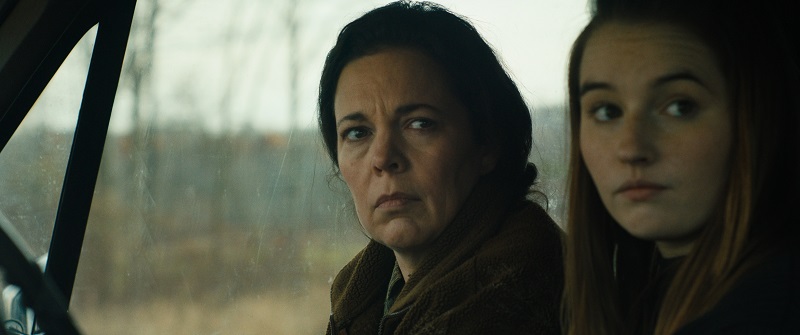
Britt Poulton: It’s really something to marvel at. Olivia can be performing the most gut-wrenching scene and we say cut, and she’s joking about whether or not she should have put two teabags in her tea because this American tea isn’t quite strong enough [they both laugh]. She is just an anomaly of a human. To be able to bob and weave in the depths of her soul with such ease. She’s great.
Britt Poulton: We love her!
The Movie Mensch: I love the close-up of her face when she learns that Mara really is pregnant and she doesn’t say a word, but she says so much.
Dan Madison: We really wanted to create opportunities in the script and moving from the script to the set, that just let our characters inhabit the human animals and to let them exist as people—to give them the space to breathe as actors and to relate to one another without dialogue, without fancy camera movements. It’s one of the things I’m really proud about.
The Movie Mensch: Now, writing is normally such a solitary endeavor. What is it about writing with each other that you guys like so much?
Dan Madison: I’ll say, I think many of the best writers in Hollywood are parts of teams.
Britt Poulton: I think for us, personally, this was our first script we ever wrote, so we don’t know another experience. This film is very much a reflection and an evolution of our creative partnership. I have to tell you, writing is hard. Writing is punishing. It is so full of doubt and uncertainty. When you have a partner in the dark, it doesn’t feel so bleak. On those moments where you doubt yourself and your talents, and what it is you’re trying to say … when you don’t see yourself clearly, your partner does, and that holds you in those dark moments and it carries you forward. Also, it’s so much more fun to share in moments of success with somebody else. Dan has borne witness to all the weak moments of my life and career, and I have as well with him. We’re really fortunate.
The Movie Mensch: It’s so true. You know, just to hear you talk about it reminds me of something the rabbi said at my wedding, “it doubles the joys and halves the sorrows.”
Britt Poulton: Yes! Oh my God. I hope you put that in your piece.
The Movie Mensch: Consider it done!

